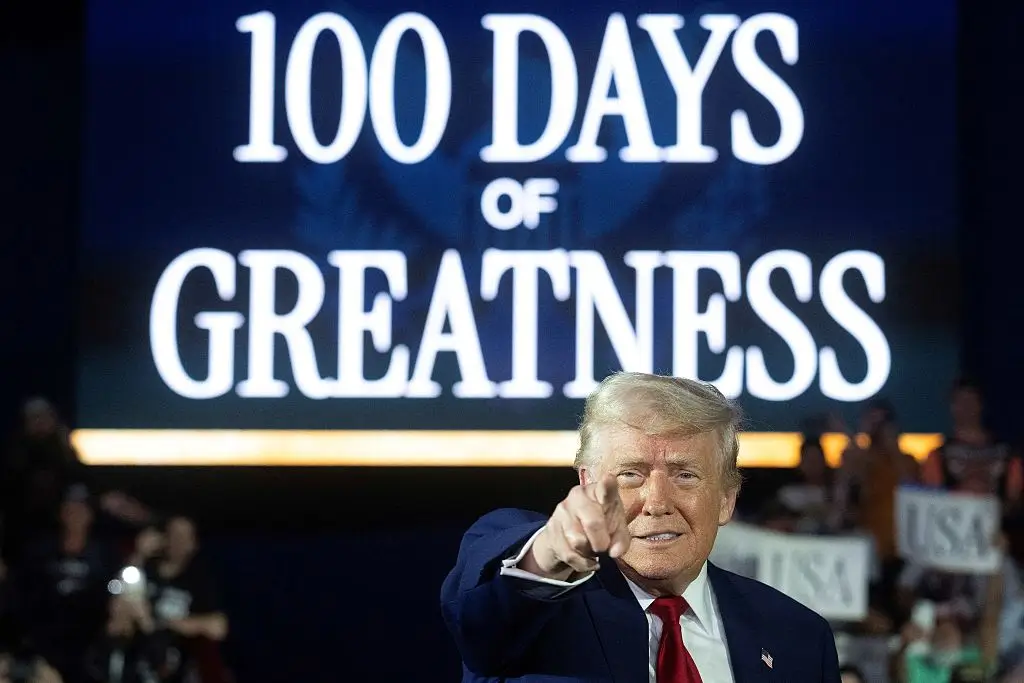‘There’s My Friend!’: Donald Trump Points Out Black Man In Awkward Moment At 100-Day Rally, Claims He’s Not Paying Him a ‘Fortune’ for Support, Skeptics Abound
Usually, when you refer to someone else by the poster they’re waving or the T-shirt they’re wearing, you’re probably not talking about a close friend. “Hey, it’s my old pal Alabama Crimson Tide,” or “Hi, I’m with stupid.”
And if you do introduce that person as a friend, it’s unlikely you’d follow up with, “I don’t even know who the hell he is,” as President Donald Trump did Tuesday night at a rally in Michigan marking his first 100 days in office.
At one point during his rambling speech, filled with questionable boasts, long-held grievances and unproven conspiracies, Trump singled out one of his most ubiquitous supporters, often seen at his rallies holding up a “Blacks for Trump” sign. The president sometimes calls him out, eager to show some color among his predominantly white crowd of supporters.

“There’s my friend, Blacks for Trump, I like that guy,” he said Tuesday. “He follows me … he follows me. We love you, your whole group has been so supportive over all these years.
“Everybody thinks I pay you a fortune,” Trump continued. “I don’t even know who the hell he is.”
But he likes him. He really likes him.
Who exactly is Blacks for Trump? Well, there are a few. More than a few, actually, as Trump received a higher percentage of Black votes than any Republican in 48 years.
Meet Maurice Woodside, aka Michael Symonette, aka Mikael Isreal, aka Michael the Black Man, as his Wikipedia page refers to him. A former member of the Nation of Yahweh cult, he was arrested and charged with one count of murder and one count of attempted murder but was found not guilty by a Florida jury in 1992.
He appeared at a Barack Obama rally in 2008, where he claimed the Ku Klux Klan endorsed the Democratic nominee. Oh, and Oprah Winfrey is the devil. Democrats, he said in 2012, are ‘the worst thing that ever happened to a Black man.” He’s been a supporter of the president ever since his initial run for the White House in 2016.
Woodside is not to be confused with “my African-American,” as Trump called Gregory Cheadle in a 2016 campaign appearance. He left the Republican party and ran for a seat in the U.S. House of Representatives as an independent in 2020, frustrated with the party’s “pro-white” agenda. Black supporters like him, Cheadle told PBS in 2019, have been used as “political pawns” by Trump.
Well, that’s a safe assumption.
Many Trump critics were quick to assume that Trump, in fact, does pay “Michael the Black Man” to appear at his rallies.
“That comment alone tells me he knows him and he def pays him plenty!” wrote one X account holder, a self-described “Republican with morals and common sense.”
Added another anti-Trumper, “I’ve never been more sure that somebody both pays and knows somebody else than I am now.”
Trump held the rally to boast about the successes of his first 100 days in office amid cratering poll numbers brought on by a crumbling economy, instability overseas, and a number of legal challenges to his broad plan to dismantle the administrative state.
“We’ve accomplished more in three months than most administrations accomplished in four years or eight years,” the president declared to loud cheers.

